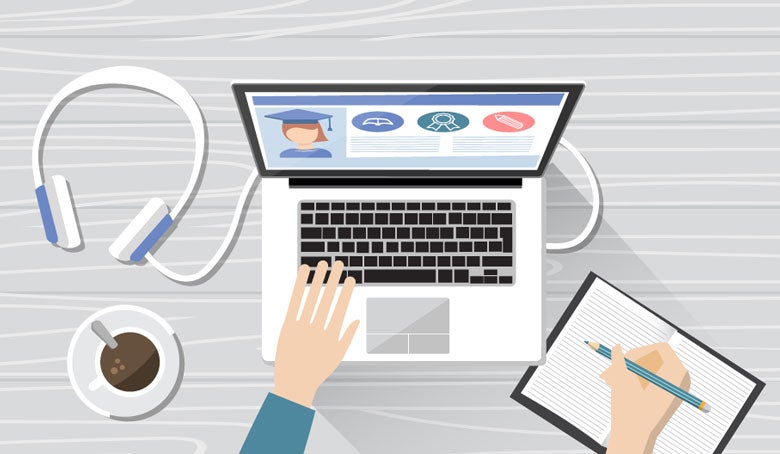MLA and EBSCO Information Services recently hosted a Library Journal webcast, “Preparing Community College Students with Research Skills for a Lifetime,” moderated by Angela Ecklund, Thesaurus Editor and Tutorial and Instructional Technology Producer, MLA International Bibliography.
The Online Mini-Course
The webinar begins with some background on the tutorials and the mini-courses covering accessibility, progression questions, badges and the ability for instructors to download and customize the tutorial videos. The MLA created these tutorials to save time for librarians and faculty who want to give students a better understanding of the scholarly research process and to optimize their use of The Bibliography and scholarly databases. The tutorials are available on Vimeo at www.mla.org/bibtutorials and free online courses are available at www.mla.moonami.com.
The Scholarly Conversation Project
Dr. Farrah Lehman Den, one of the creators of the online mini-courses and an index editor for the MLA International Bibliography, discusses how to engage students with the MLA International Bibliography using The Scholarly Conversation Project. (Click the ‘Research’ tab on the MLA Style Center Teaching Resources page.) Dr. Lehman Den says students “gather evidence that may be used to draw conclusions about the ways that the ‘scholarly conversation’ around a topic has changed over the last sixty years.”
Using the MLA Bibliography in the Community College Composition Classroom
Dr. Leah Richards teaches English 101: Composition I to a very diverse community of students at LaGuardia Community College, City University of New York. Developing courses for her student body poses some challenges and, as she puts it, “Given the diversity of our students and their backgrounds, there are very few experiences or skills that we can assume all of our students have.”
One of the learning objectives of English 101 — a required course and pre-requisite for many others — is to “provide later assignments that enable students to develop research skills, most importantly the evaluation and synthesis of primary and secondary sources.”
My goal is for my students who move on to those other classes to already have what they need and, to that end, I use The Bibliography to introduce databases, research terminology and negotiating general or discipline-specific databases.
My goal is for my students who move on to those other classes to already have what they need and, to that end, I use The Bibliography to introduce databases, research terminology and negotiating general or discipline-specific databases.
While other classes she teaches focus on literary analysis, Dr. Richards’ focus in teaching English 101 is on developing research skills. She uses the MLA Bibliography and its teaching tools to achieve that objective. “My goal is for my students who move on to those other classes to already have what they need and, to that end, I use The Bibliography to introduce databases, research terminology and negotiating general or discipline-specific databases.”
Due to the rapid shift to distance learning this spring, her students needed to adapt and Dr. Richards needed to quickly redesign her course. She often centers courses around pop culture artifacts. She walks students through an MLA Bibliography search for “pop culture” to familiarize students with the concept. She then demonstrates how to narrow the focus of the search. From there, she helps them see how to develop a line of inquiry. Changing the date range familiarizes students with how to use research databases, and it shows how the treatment of the topic has changed over time. “This allows students to draw some conclusions about society...about what society values.”
The need to “pivot” to entirely distance learning has its challenges, but has yielded positive results so far, according to Dr. Richards: “Despite the extraordinary circumstances of this semester, it’s looking like this could be the most successful version of this sequence of assignments yet.”
Resources from the Modern Language Association
The Modern Language Association is a non-profit organization whose mission is to promote “the study and teaching of languages and literatures through its programs, publications, annual convention, and advocacy work.” Teaching resources are available on the MLA Style Center site. Since many classes shifted from in-person to online during the COVID-19 crisis, the MLA set up a site with resources for teaching remotely called Bringing Your Course Online. The MLA Commons’ open, peer-review site, Digital Pedagogy in the Humanities, Concepts, Models and Experiments, is “a curated collection of reusable and remixable pedagogical artifacts for humanities scholars in development by the Modern Language Association.”
Watch the webinar for background on how the courses were developed, an overview of the courses, and to hear more about integrating the MLA International Bibliography into the community college curriculum to teach research skills that will serve students throughout college and beyond.
